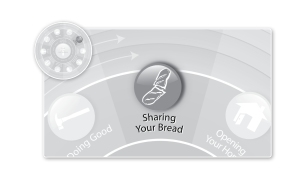Part V of our series on Sharing Your Bread
 Why does God give food, according to our last post? For fellowship with him. In body, soul, and spirit.
Why does God give food, according to our last post? For fellowship with him. In body, soul, and spirit.
So when the crowd begins to say in John 6:14, “Surely this is the Prophet who is to come into the world,” they misidentify him.
You can see that misidentification even more deeply in John 6:42, where they say,
Is this not Jesus, the son of Joseph, whose father and mother we know? How can he now say, “I came down from heaven?”
They identify him in a completely physical way. They have a sense that he is giving them bread “from above” (that is, they understand the provision part) but they fail to see that this bread is designed to be a gift of fellowship with their heavenly Father, who wants to be their host at table and who wants to invite a whole lot of guests with whom they’d rather not eat.
In other words, they miss the worship part.
Instead (verse 15), they want to receive Jesus as a human bread factory designed to strengthen their bodies. This will enable them to focus even more completely on earthly things, like making a living, taking care of their families, breaking free from Roman rule, and avoiding fellowship with people with whom they’d rather not fellowship.
When our physical needs are met without attention to our spiritual needs, it’s a curse, not a blessing, because it puts us in worse bondage (to our flesh) than before we ate.
This is why the Work of Mercy of sharing your bread can’t be about simply providing food to those who don’t have it in order to satisfy human hunger. When we do that, all that happens is that we help people to continue focusing on their physical needs and ignoring the Father. For God, physical food is provided for the heavenly feast. It is only one part of all he wants to provide. He wants to nourish every part of the human being–body, soul, and spirit—and that can only happen through his presence at every meal.
So the first step on our path of learning the Work of Mercy of sharing your bread this month is to examine from where we think our food comes, and to where we think it is pointing. When we eat breakfast or lunch or dinner, do we receive it like Isaiah 55 or like Genesis 3? Do we seek first the kingdom of God knowing that all these things (like physical bread) will be added? Or do we work for physical bread that spoils? And for what purpose do we eat? Do we stuff our face to fill our stomachs? Or do you see each meal as God’s invitation to fellowship with him and others in Jesus’ name? As you share your bread, do you—and those with whom you share it—know from where it comes, and to where it is pointing? Or are you simply providing them with manna from heaven…that will spoil such that those who eat it will die (John 6:49)?
Remember: it’s not that physical food is the food that perishes and that Bible study is the food that endures.
The physical realm is not a mere analogy for Jesus. It is the place where God’s glory is manifested. So every meal—every time you break bread—is either an opportunity to manifest God’s glory and to eat with others in a way that what you eat never perishes but instead builds up the body, soul and spirit, or it becomes nothing more than a focus on the physical, leading you (and any to whom you give such bread) ultimately back to dust.
Here’s a challenge: Pray to God and ask yourself, “What does it look like to share my bread so that each meal I eat endures to eternal life?”
Start by eating one meal like that this week. I’d love to hear from you in the comment section of this post how the experience went for you.











my wife and i lead a Bible study for jr & sr high students each tuesday in our living room. we normally serve hot chocolate & cookies (that is, after all, the only thing we can really afford). after hearing your “sharing your bread” podcasts, i’ve been deeply convicted about missing the point: up to now, the sweets we provide are just a nice addition to the “real meat” of Bible study; i’m growing to see our physical food as one and the same as the Bible study, all gifts of God. so my wife & i prayed about it last week and recognized we’ve been Called to God’s Table, and yesterday we let Him be Host: to the surprise of the students, we all sat around a big table and shared a full meal of roast chicken, mashed potatoes, green beans, mac-n-cheese – you know, good stuff. i taped isaiah 55:1-5 on our front door which students had to read before they could enter, and told them the only cost for the meal was Hunger, Thankfulness, and Honesty. after we had enjoyed our fill, we stayed at the Table and studied Scripture together (romans 1, in fact). my wife & i feel compelled to take this approach each week from now on, not to “keep them coming back”, but to extend Christ’s invitation to God’s Table. makes me feel like a guest in my own home.
“A guest in my own home”–what a great insight, James! Yes, the Lord hosts us–even (and especially) in our own homes, which we come to recognize more and more are really HIS home.
Excellent work, James! Very exciting!